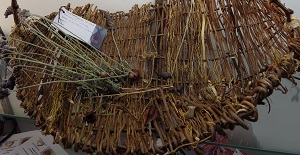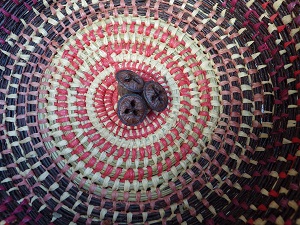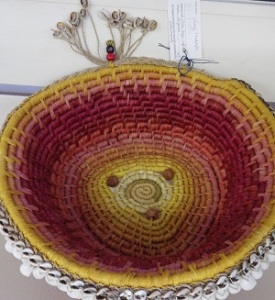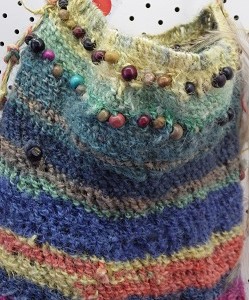On 19 September, 2014, I had the privilege of opening Weaving Together, a collaborative exhibition at the Platypus Gallery, in Forbes. New South Wales, showcasing the work of weavers from the Condobolin Wiradjuri Arts Group and the Orange Fibre Artists Group.

Melon basket by Debra Callis, Wiradjuri Arts Group, Condobolin, woven from cat’s claw and wisteria, 2014. Photo by Merrill Findlay.
Please let me first acknowledge the Wiradjuri people as the traditional custodians of the land we now share, pay my respect to all elders of the Wiradjuri nation, past and present, and extend my respect to all other First Peoples. In the words of poet Jonathan Hill, a Dhurga man,
We honour the presence of these ancestors
Who reside in the imagination of this land
And whose irrepressible spirituality
Flows through all creation.

Deep basket (detail) woven from raffia, silver birch, sedge grass, with gum nut, by Lanny MacKenzie, Orange Fibre Artists Group, 2014. Photo by Merrill Findlay.
For me, as a descendant of ‘boat people’ who first settled in the upper catchment of our Kalari-Lachlan River in around 1839, and slowly migrated downstream to Lake Cargelligo, Condobolin and beyond, it’s a great honour and privilege to have been invited to open this exhibition showcasing the work of fibre artists from throughout our region. From Orange to Lake Cargelligo. On behalf of the people of Forbes, I’d like to welcome these artists to our town, and thank you for this inspiring exhibition and for the cultural exchange we are all now part of.
This exhibition is of great cultural significance. A very practical demonstration of the way people from many different backgrounds can work together to reclaim and revitalise ancient traditions, forge new friendships, and re-weave our often-painful shared histories into new stories of great hope and into objects of great beauty.
 Last weekend I met some of the Aunties from the Hands On Weavers Group in Wagga, and their supporters from Narrandera and the Wagga Art Gallery. Linda Elliott told me about their efforts to reclaim and revive traditional Wiradjuri weaving practices along the Murrumbidgee River. She described the early workshops facilitated by the late Judy O’Neill and Liz Reynolds through the former CMA (Catchment Management Authority) some years ago, and the inspiration locals received from a friend of mine, Louise Hamby, from the Australian National University. Louise has been working for years with fibre artists in Gapuwiyak, in Arnhem Land, and elsewhere in Northern Australia. In 2011 she organised a travelling exhibition called Women with Clever Hands: Gapuwiyak Miyalkurrurwurr Gong Djambatjmala [exhibition education kit >>] which gave other communities an opportunity to see the Gupuwiyak women’s work. The tour included Wagga Art Gallery … and so began an incredible sharing of knowledge which has inspired weavers from all backgrounds throughout inland NSW. Including many of the artists whose work you see here.
Last weekend I met some of the Aunties from the Hands On Weavers Group in Wagga, and their supporters from Narrandera and the Wagga Art Gallery. Linda Elliott told me about their efforts to reclaim and revive traditional Wiradjuri weaving practices along the Murrumbidgee River. She described the early workshops facilitated by the late Judy O’Neill and Liz Reynolds through the former CMA (Catchment Management Authority) some years ago, and the inspiration locals received from a friend of mine, Louise Hamby, from the Australian National University. Louise has been working for years with fibre artists in Gapuwiyak, in Arnhem Land, and elsewhere in Northern Australia. In 2011 she organised a travelling exhibition called Women with Clever Hands: Gapuwiyak Miyalkurrurwurr Gong Djambatjmala [exhibition education kit >>] which gave other communities an opportunity to see the Gupuwiyak women’s work. The tour included Wagga Art Gallery … and so began an incredible sharing of knowledge which has inspired weavers from all backgrounds throughout inland NSW. Including many of the artists whose work you see here.

String bag by Helen Worsley, Orange Fibre Artists Group, 2014. Created from hand-dyed jute, beads and emu feathers. Photo by Merrill Findlay.
I’ve also been privileged to see the work of pioneering Wiradjuri weavers like Bev Coe from Condobolin. Indeed, it was Bev who taught Lanny MacKenzie and others from the Orange group how to weave the Wiradjuri way. Lanny has since exhibited at the Wirksworth Rural Arts Festival, in Derbyshire, as part of the Pavilion Project. She combined the skills Bev Coe taught her with her own Chinese and Balinese traditions to create enchanting transcultural objects at the Derbyshire EcoCentre.
I’ve also witnessed the impact these weavers have had right here in Forbes. In 2013, the Orange group conducted workshops leading up to our River Arts Festival, for example, and then brought car-loads of willow lanterns, baskets and other artworks to our festival. They have since taught and inspired many other people through their workshops. [Read about their first Forbes workshop in the Forbes Advocate >> ]

Bucket basket (detail) by Debra Callis, Wiradjuri Arts Group, Condobolin, woven from sedge grass and raffia, with gum nuts, 2014. Photo by Merrill Findlay.
So you weavers are very powerful women! You are weaving together not only diverse plant materials, but also diverse people, and, in the process, you are co-creating a future that will be very different from our troubled pasts. Under your watch, this galley has become a place of healing and of reconciliation. Reconciliation not only between Wiradjuri and non-Wiradjuri people, but with Mother Earth too. My people’s actions over the past two hundred years have damaged this land we now share dreadfully but, through your weaving, you are showing us a different way. By gently harvesting plant material, colouring it with natural dyes, and creating beautiful objects, you are showing us all how we might tread more softly upon this earth so that, in another 40,000 years, women like us will still be able to weave native grasses into beautiful baskets, bowls and bags for pleasure and for utility. Thank you for these lessons.

Lanny MacKenzie at work with English willow and other plant material at the Derbyshire EcoCentre, England, in 2013. Photo by Merrill Findlay.
It is a great honour for me to now declare this exhibition open.
Article about the exhibition in the Forbes Advocate, with great photos of the artists >>
Post created 7 January 2015. Last updated 8 January 2015.
Permalink https://merrillfindlay.com/?p=4101
